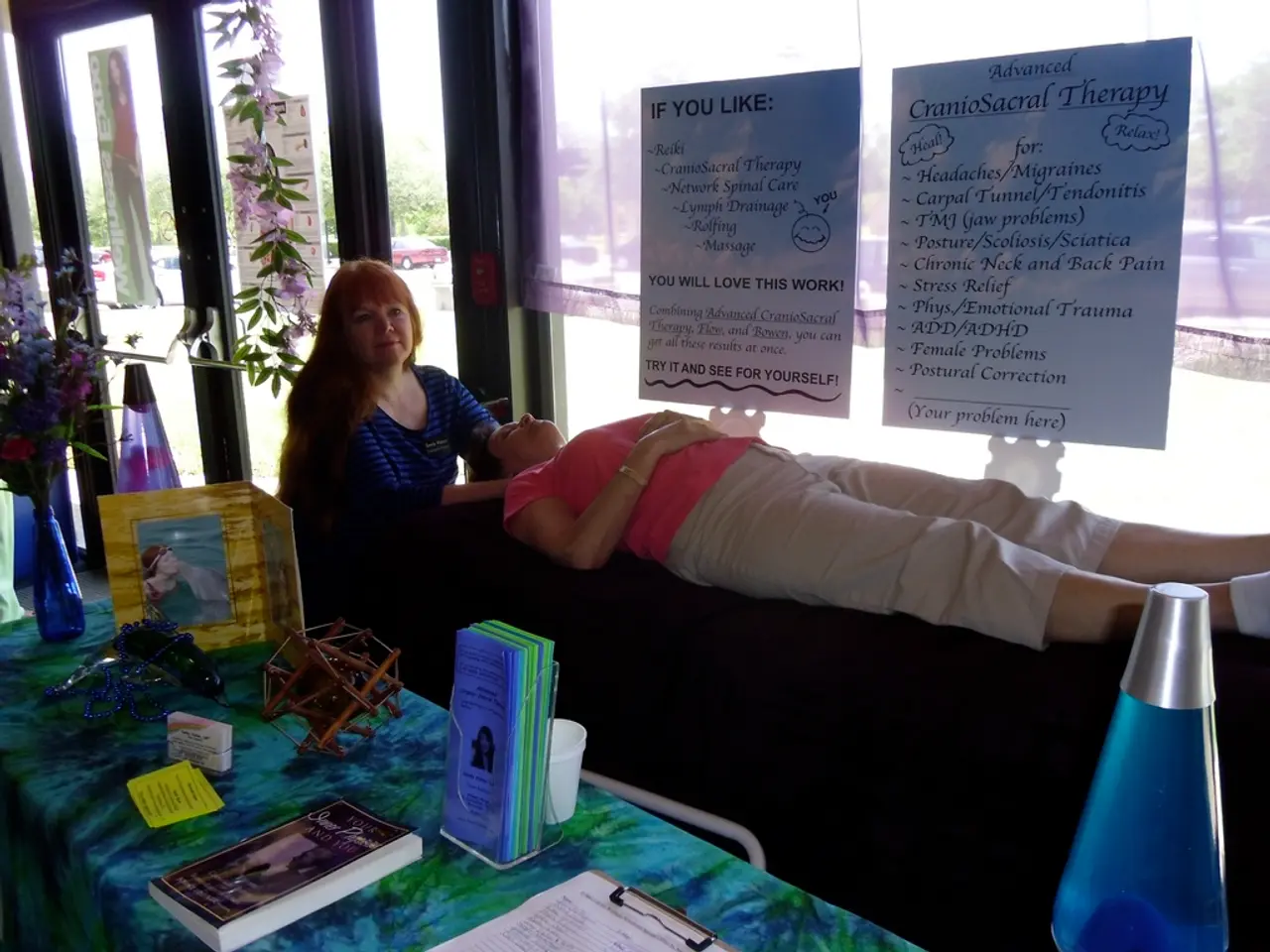Connection Between Menopause and Insomnia: Extent, Duration, and Solutions
In the journey through menopause, many women experience insomnia, a condition characterized by difficulty falling or staying asleep. This article explores various complementary therapies and lifestyle changes that can help manage menopause-related insomnia.
Research has shown that insomnia can exacerbate depression, and the relationship between sleep and mood is bidirectional. As women age, the incidence of insomnia increases, with 16-42% in premenopause, 39-47% in perimenopause, and 35-60% in postmenopause experiencing insomnia.
Several factors can contribute to insomnia, including stress, an uncomfortable sleep environment, exposure to blue light, bad dreams or night terrors, disruption to circadian rhythm, sleep disorders, and certain medications. Some medications, such as beta-blockers, corticosteroids, statins, SSRIs, a combination of chondroitin and glucosamine, alpha-blockers, cholinesterase inhibitors, angiotensin II receptor blockers, angiotensin converting enzyme inhibitors, and nonsedating H1 agonists, can cause insomnia as a side effect.
Doctors rarely prescribe sleeping pills to treat insomnia due to their serious side effects and addictive nature. Instead, they may suggest cognitive behavioural therapy (CBT), especially CBT tailored for menopausal symptoms. This form of therapy significantly reduces hot flashes, night sweats, improves mood, sleep quality, and quality of life. Both group and self-help CBT formats have demonstrated efficacy.
Physical exercise, such as yoga, Tai Chi, and walking/jogging, are also effective in treating insomnia and poor sleep. Studies show that Tai Chi provides some of the longest-lasting benefits. Lifestyle modifications, including regular physical exercise, maintaining good sleep hygiene, and a balanced anti-inflammatory diet rich in omega-3 fatty acids, fruits, and vegetables, support better sleep and mood stability.
Mindfulness and stress-reduction techniques, such as clinical hypnosis and general mindfulness practices, can alleviate menopausal symptoms and improve sleep by reducing stress and anxiety. Nutritional supplements such as L-theanine, St. John’s wort, pollen extract, and Asian ginseng may help with menopausal sleep problems, as well as mood changes and hot flashes.
In some severe insomnia cases, short-term use of melatonin or other sleep aids may be beneficial, but should be used cautiously and under medical advice.
For a holistic approach, these complementary therapies can be combined with good sleep hygiene and potentially supplements. CBT and exercise (Tai Chi, walking) are the most strongly supported and safe non-pharmacologic complementary therapies alongside yoga for managing menopause-related insomnia.
Hot flashes, one of the so-called vasomotor symptoms, affect 75-85% of people going through menopause. Aromatherapy, particularly lavender essential oil, may help reduce hot flashes and induce relaxation, improving sleep. Hypnosis may reduce the frequency and severity of hot flashes by up to 50% and could be a helpful complementary treatment for insomnia caused by hot flashes.
In conclusion, understanding the causes of insomnia and employing a combination of complementary therapies, lifestyle changes, and good sleep hygiene can significantly improve sleep quality and overall well-being during menopause. If you have had trouble sleeping for months, your insomnia is affecting your daily life, or changing your habits and bedtime routine has not helped, it is essential to seek guidance from a doctor.
- In menopause, women frequently encounter insomnia, a condition marked by difficulty initiating or maintaining sleep.
- The link between sleep and women's mental health is complex, as insomnia often exacerbates depression, and the relationship is reciprocal.
- As women progress through menopause, the likelihood of insomnia increases significantly, with premenopausal, perimenopausal, and postmenopausal women experiencing rates ranging from 16-60%.
- Numerous factors contribute to insomnia, including stress, sleep environment, blue light exposure, sleep disorders, certain medications, and vasomotor symptoms like hot flashes.
- There are a variety of complementary therapies and lifestyle changes that can help manage menopause-related insomnia, such as cognitive behavioral therapy (CBT), physical exercise (yoga, Tai Chi, walking/jogging), mindfulness, stress-reduction techniques, aromatherapy (lavender essential oil), and nutritional supplements.
- CBT, exercise practices like Tai Chi and walking, yoga, and good sleep hygiene are the most supported and safe non-pharmacologic complementary therapies for managing menopausal insomnia.
- In severe cases or when insomnia persists despite lifestyle changes and supplements, it is advisable to seek guidance from a healthcare professional who can evaluate the need for short-term use of melatonin or other sleep aids.




